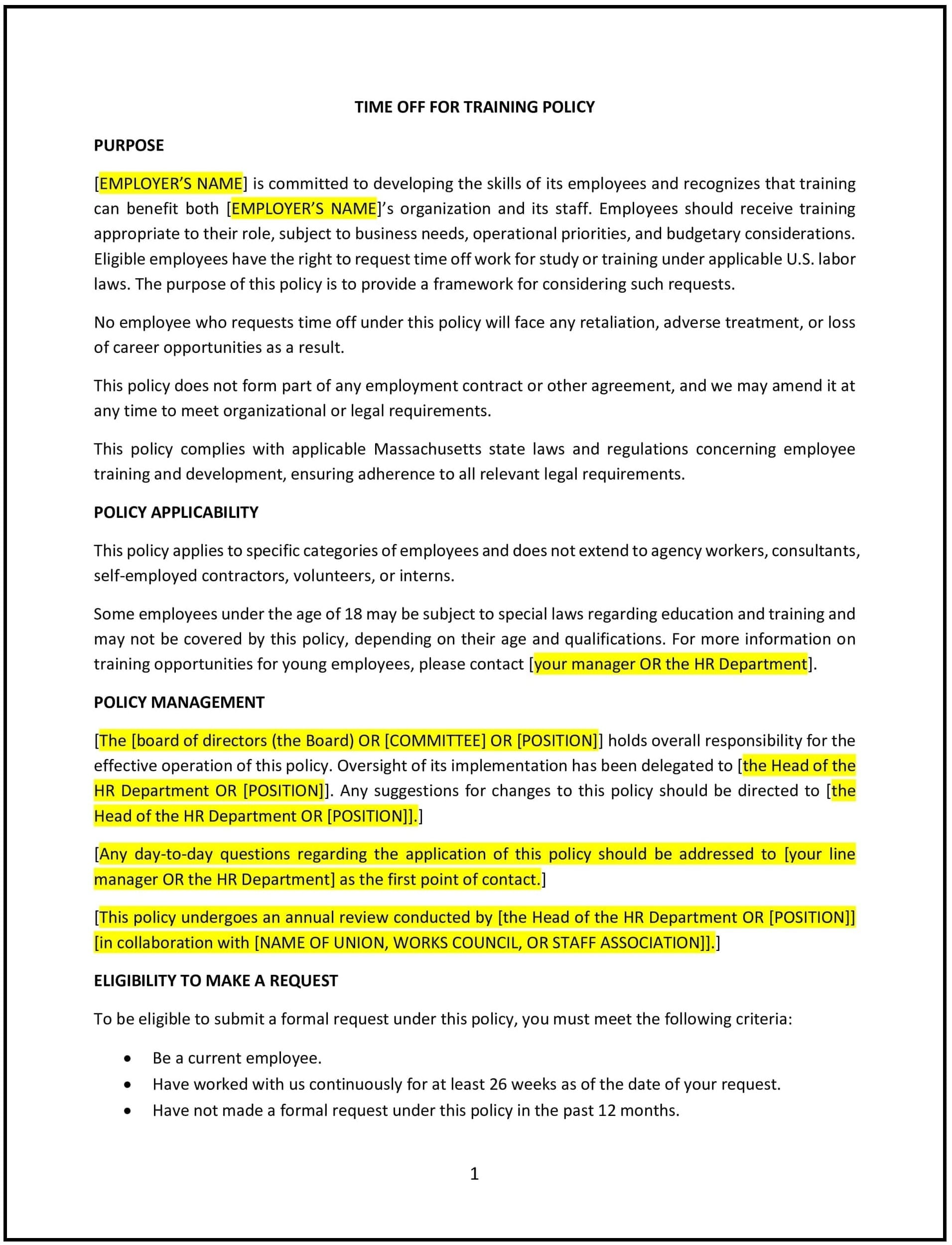Time off for training policy (Massachusetts): Free template
Got contracts to review? While you're here for policies, let Cobrief make contract review effortless—start your free review now.

Customize this template for free
This time off for training policy is designed to help Massachusetts businesses support employee development by providing time off for job-related training, education, or professional development activities. The policy outlines the process for requesting time off for training, the types of training that qualify, and any necessary documentation or approvals. It helps businesses balance employee development with operational needs while supporting compliance with Massachusetts state laws.
By adopting this policy, businesses can promote a culture of continuous learning, enhance employee skills, and improve performance, all while maintaining productivity and operational efficiency.
How to use this time off for training policy (Massachusetts)
- Define qualifying training: Specify what types of training are eligible for time off, such as job-related courses, workshops, certifications, or industry conferences. The policy should clarify whether both internal and external training opportunities are covered.
- Outline the approval process: Establish a clear process for requesting time off for training. Employees should be required to submit a request in advance, providing details about the training and how it benefits their role. The policy should specify how much notice is required for approval and any documentation that needs to be provided.
- Specify the duration of time off: Define the amount of time off employees are entitled to for training. This may include full days or partial days, depending on the nature of the training and its relevance to the employee's job. The policy should outline whether the time off is paid or unpaid.
- Address training-related expenses: Clarify whether the company will cover any expenses associated with training, such as course fees, travel costs, or materials. If expenses are covered, the policy should specify the process for reimbursement.
- Set expectations for training during work hours: If the training occurs during regular work hours, the policy should specify whether employees will be compensated for the time spent in training or if they need to make up the hours. The policy should also address how time off for training will impact regular work responsibilities.
- Ensure compliance with Massachusetts and federal laws: Ensure that the policy complies with Massachusetts state laws regarding paid leave, including the Massachusetts Paid Family and Medical Leave (PFML) law. The policy should also align with federal regulations, including those related to wage and hour laws (e.g., Fair Labor Standards Act, FLSA).
- Review and update regularly: Periodically review and update the policy to ensure it is compliant with changes in Massachusetts state laws, federal regulations, and company practices.
Benefits of using this time off for training policy (Massachusetts)
This policy offers several benefits for Massachusetts businesses:
- Supports employee growth and development: By providing time off for training, businesses invest in employees' professional development, helping them enhance their skills and knowledge.
- Improves job performance: Training opportunities lead to improved job performance, better decision-making, and higher quality work. Employees who receive training are more likely to be productive and efficient in their roles.
- Increases employee satisfaction and retention: Offering time off for training demonstrates that the company values employee development, which can improve job satisfaction and reduce turnover.
- Promotes a culture of learning: A structured policy for time off for training encourages continuous learning and professional growth within the company, helping employees stay up-to-date with industry trends and best practices.
- Aligns with company goals: Time off for training ensures that employees are equipped with the skills and knowledge necessary to contribute to the company’s success, ultimately aligning personal development with organizational goals.
- Promotes legal compliance: By aligning the policy with Massachusetts state laws and federal regulations, businesses reduce the risk of legal challenges or violations related to paid or unpaid time off.
Tips for using this time off for training policy (Massachusetts)
- Communicate the policy clearly: Ensure that all employees are aware of the time off for training policy and understand how to request time off. Include the policy in the employee handbook and discuss it during onboarding or regular training sessions.
- Encourage professional development: Promote training opportunities that align with employees' career goals and the company’s objectives. Encourage employees to take advantage of available training resources to improve their skills and knowledge.
- Establish a transparent approval process: Make the approval process for time off for training clear and efficient. Employees should know exactly what is required to request training time off and how long the approval process will take.
- Track training participation: Keep a record of employees' training participation and the time off granted for training. This helps ensure that training opportunities are being utilized and that time off is managed effectively.
- Provide support for training expenses: If the company covers training-related expenses, ensure employees know how to submit reimbursement requests and what expenses are eligible. Streamlining this process will encourage employees to take part in development opportunities.
- Review and update regularly: Periodically review the policy to ensure it is compliant with Massachusetts state laws, federal regulations, and any changes in the company’s training and development initiatives.